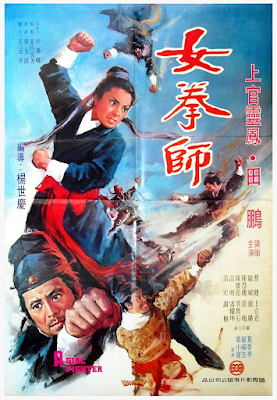Showdown (1972)
Aka: Royal Fist
Chinese Title: 天王拳
Translation: Heavenly King Fist
Starring:
Jimmy Wang Yu, Chang Ching-Ching, Chiang Pin, Lu Ti, Fuh Bih-Huei, Chan
Wai-Lau,Ke Fu-Chen, Shan Mao, Hsueh Han
Director:
Ting Shan-Hsi
Action Director: Kwan Hung
When is an early 70s basher not
an early 70s basher? The answer is: When it’s Jimmy Wang Yu’s Showdown.
In that case, what would appear to be an early 70s basher is actually
closer to a wuxia pian, but set in the Republic Era. Not many wuxia
films are set after the Qing Dynasty, the only one that sorta comes to
mind is What Price Survival? From 1994. This an odd duck of the film,
which sort of follows Jimmy Wang Yu’s movement in the direction of weird
when it came to his kung fu movies—perhaps as a way to offset his limited
formal MA training.
The movie opens at a camp of Chinese
soldiers, presumably at some point during the Warlord Era. The soldiers, led by
(whom I think is) the Purple Darts’ Chou Shao-Ching, are out collecting
taxes and have just bought themselves a young lady for their amusement and
pleasure. Before they can molest the poor girl, a stranger in white (Jimmy Wang
Yu, who needs no intro) shows up and rescues her. At about the same time, a
bunch of bandits clad in black show up and steal all the money. The stranger, Fong
Xiao Ching “the White Dragon”, has come to the region looking for the bandits
who murdered his father. Could they be the same people who stole the tax money?
Anyway, Fong takes the girl—who was
injured during the raid—to the nearest inn, run by Tang Sung (Lu Ti, of Four
Riders and Man of Iron). Tang Sung was the martial brother of Fong’s
dad and now runs the inn together with his wife (Fuh Bih-Huei, Heroes Behind
Enemy Lines and Fantasies Beyond the Pearly Curtain), his mother (The Fearless Hyena’s Chan Wai-Lau in drag), and his children and their
families. What Fong Xiao Ching discovers after his arrival is that he had
actually had an arranged marriage to Tang’s youngest daughter, Hsiang Yen
(Chang Ching-Ching, The One-Armed Swordswoman and The Big Fight).
So, those two start exchanging flirty looks. At the request of Granny, Fong and
Hsiang Yen are wed. It is only then that Fong discovers that the Tang family
are robbers and the price for leaving the inn and its environs is death…
The thing is, Showdown is a mix
of genres, mainly kung fu and comedy. Several scenes are sped up for obvious
comic value, like whenever someone is running away from someone else, or when
the aforementioned soldiers show up at the inn looking for a free meal.
Moreover, there are a number of esoteric styles mentioned and displayed,
including the ability for Fong Xiao Ching to disappear and reappear several
yards away, a lá Nightcrawler from the X-Men. That sort of approach to the
action, combined with the fact that most of the fights involve weapons, give
this film a more wuxia feel. Indeed, if it were set in any dynasty prior
to the Republic Era, it would surely be classified as a wuxia by
filmgoers.
The action sequences are staged by Kwan
Hung, who also did the action for JWY’s Rage of the Masters and Beach of the War Gods. Much like wuxia films, characters can jump—through reverse
footage projection—up entire cliffs, kick stand and dirt as if they were projectiles,
and all sorts of craziness. Chang Ching-Ching wields a pair of double short
swords known as “The Twin Blades of Doom.” Wang Yu also wields a sword, but
sometimes engages in hand-to-hand combat, like during a duel with Taiwanese
regular Shan Mao, who plays a Japanese bandit. At that point, the fighting is
typical JWY arm flailing. In another fight, he takes on an entire bandit army
(brandishing swords, whips and staves) with a log of wood. It all culminates in
a 10-minute climax in which the evil bandits (led by JWY regular Hsueh Han)
team up with the soldiers to attack the inn, and JWY and Chang Ching-Ching
fight them off with swords. The choreography picks up a bit in this sequence,
considering that Wang Yu was more convincing with a weapon than with his bare
hands. In the end, Showdown is harmless fluff that I’d recommend more
for Jimmy Wang Yu completists.












